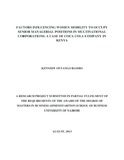| dc.description.abstract | This research set out to fill the gap of knowledge concerning the role of women in the business
world as a whole by zeroing in on the realm of International Business, specifically Multinational
corporations. The researcher undertook a case study of Coca-Cola in Kenya, where the incidence
of women labor force participation in senior managerial positions is very low. The objective of
the research was to analyze the determinants of women's ability to participate in corporate
governance, specifically, to determine the role, if any, women play in International Business,
specifically in MNC and shed light to the inquiry why women seem not to par with men in
international business. Data for the research was collected through the use of an interview guide,
which was composed of both structured and unstructured questions relating to the field of study.
After the data was collected, it was categorized into two groups namely, quantitative and
qualitative data and, two types of statistical analysis were used, with the qualitative data will be
analyzed through the use of content analysis, while quantitative data was analyzed using
descriptive statistics, including percentages. After analyzing the data, the research came up with
findings, such as that the very culture of the organization has greatly contributed to the low level
of women involvement in senior managerial positions, because the organization culture is male
dominated, and greatly influenced by the internal informal structures created by the male
employees, making it difficult for women to adapt to the culture and effectively perform their
duties. Another finding was that, the role of women in the company's (Coca-Cola) day to day
operations is focused on implementation roles and less on decision making. Finally, the research
came up with conclusions, such as that women mobility and career advancement to occupy
senior managerial positions in an organization is influenced by varied factors that emanates
within the organization and within its environment of operation. Further, the research concluded
that there was need to spend extra time and energy improving the leadership skills of the
management staff to ensure that they understand, can communicate about, and support women
empowerment process in the organization. Having made conclusions, the research recommended
that there is an urgent need to have managerial policies and strategies within organizations that
successfully empowers women involvement in business, while keeping focus on organization objective | en_US |

